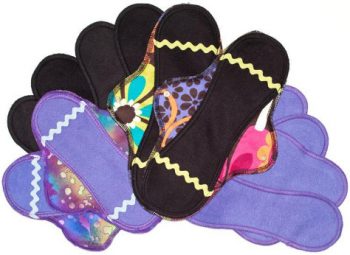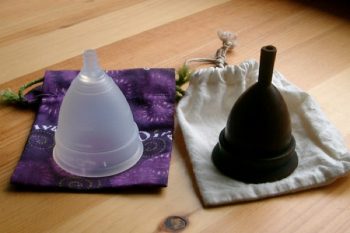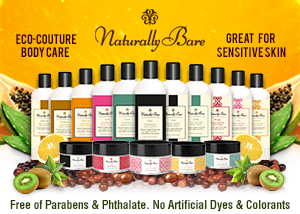Is Your Feminine Care Safe? 3 Non-Toxic Alternatives

Women share the experience of menstruating with one another, but rarely is the topic openly discussed, and rarely are any concerns about the safety of feminine “hygiene” products brought to public attention. However, we ought to be concerned about conventional tampons and pads because they are full of toxic chemicals and non-disclosed ingredients.
Synthetic fibers, chemically-soaked cotton, petrochemical and plastic additives, hazardous odor neutralizers and fragrances, and rayon that is chlorine-bleached (a process shown to release cancer-causing dioxin and other by-products)—manufacturers aren’t required to disclose ingredients because feminine hygiene products are considered “medical devices.”
The toxic dangers are real, and the last thing a woman should have to deal with for such a sensitive part of the body—and sensitive time of the month.
– Chemicals absorb straight into the bloodstream through the highly permeable skin of the vaginal area, accumulate in the organs, and typically we lack necessary enzymes to break them down.
– Yeast and bacteria growth are more likely from synthetics and plastics that restrict air flow and trap heat and dampness.
– Bacteria growth can lead to staphylococcus aureus (staph) or group A streptococcus (strep) which causes Toxic Shock Syndrome (TSS), a life-threatening condition.
– Dioxin (from chlorine that gives pads and tampons that clean, white look) poses serious health risks, including abnormal tissue growth in abdomen and reproductive organs, abnormal cell growth, and disruption to the immune, hormonal and endocrine systems.
– Odor neutralizers and artificial fragrances are laced with contaminants linked to hormone disruption, cancer, birth defects, dryness and infertility
A study reported in The Huffington Post by Andrea Donsky and Dr. Joseph Mercola found that exorbitant amounts of plastic are found in conventional sanitary pads—the equivalent of four plastic bags. With the well-known hazardous nature of plastics and petrochemicals like BPA and BPS (disruption to embryonic development, heart disease, and cancer), this alone is cause for concern.
Donsky and Mercola also noted the use of GMOs and pesticides in feminine care products. If 94% of all US cotton is genetically engineered, one can figure that the cotton in conventional tampons is genetically modified and full of pesticides used to spray cotton crops.
GMO cotton, pesticides, toxins, lots of plastic—these are not things a woman wants inside her body. In addition, there is the issue of environmental impact from manufacturing and waste. Used feminine products create huge amounts of waste; clogging sewers, littering beaches, and piling up in landfills.
The average woman uses about 16,800 pads or tampons over the course four decades on average of menstruation—that’s 250 to 300 pounds of waste per person. In the U.S. alone, 12 billion pads and 7 billion tampons are disposed of annually.
So, if you’re concerned about your health and reducing environmental waste, check out these safe, comfortable, and eco-friendly alternatives:
Reusable, washable pads
Cloth rags and pads have been used throughout the ages, so there is a long history of this simple and natural option. They come in a variety of colors, sizes, and even fabrics (organic cotton to bamboo fiber), often with a snap button to keep them in place.
Wash your cloth pads by hand, pre-soaking them after use. If using all-natural soap (Dr. Bronner’s soap works great), you can even dump the used water directly on the earth. And if you can’t wash them right away or are traveling, put them in a plastic bag and soak them in hot water when you get the chance.
Reusable pads cost anywhere between a few dollars to $15 for one, but often you can find them at an affordable cost in a set and they can be reused for three to five years or more.
You can purchase them from a variety of sources, including:
Luna Pads – organic cotton, feature 2 parts (a pad base and an insert), and sized 8” to 14” long
Glad Rags – organic, un-dyed cotton, come in many sizes (heavy flow, light flow, post-partum, teens)
Lady Luxuries Mama Cloth – organic bamboo cloth pad, variety of sizes
Make your own from old t-shirts, washcloths, etc.
Moon cups
These reusable latex, silicone or rubber cups are a revolution for women – arguably the most environmentally-friendly (they take less water to clean than reusable cloth pads), affordable, and easy option for “moon time.”
The cups are inserted in the vagina and collect blood, up to 30mL at a time. They can be worn for up to 12 hours, even during heavy flow, so you only have to empty it twice a day. They’re odorless, mess-free, and easy to wash. Simply remove, dump out contents, rinse and reinsert. (If you’re in public restroom situation, you can wipe it clean with toilet paper.)
After your cycle, sterilize the cup using DivaWash or similar organic soap. Most brands come with a cute pouch to store it in. Since there is no risk of TSS, you can practice trying it out when you’re not bleeding.
They require an upfront cost around $35 – $50, but they can be reused for ten years or more. That’s much less than one would pay for 6-12 boxes of tampons each year. Check out these reliable brands:
Diva Cup – two sizes, non-latex silicone
Keeper – two sizes, natural gum rubber (latex)
Soft Cup – use one cup per cycle, hypoallergenic, non-toxic, latex-free material
Check out this website for more brands and reviews
Disposable Feminine Care
Lastly, if you are looking for a disposable option, go organic cotton and biodegradable (around $5-7 a box). Try out:
Seventh Generation organic cotton tampons
Seventh Generation chlorine-free pads
Natracare organic cotton, chlorine-free, plastic-free tampons
Natracare organic cotton, chlorine-free, biodegradable pads
Interested in becoming a part of the movement to bring these health and safety concerns to the forefront? Join Women’s Voices for the Earth to ask Congress to support research on toxic chemicals in feminine products, and tell the popular feminine care brand Always that its message about women’s empowerment is hypocritical, since the company has refused to reveal its own product ingredients.
Share this information with women you care about, and take a stand for the women’s health and the environment.
Check out this video demonstrating the chemical difference between organic cotton and conventional pads.




September 15th, 2015 at 1:13 am
[…] more thing to worry about? My favorite pads are Naturacare and Seventh Generation, for their use of natural fibers, which is essential for […]